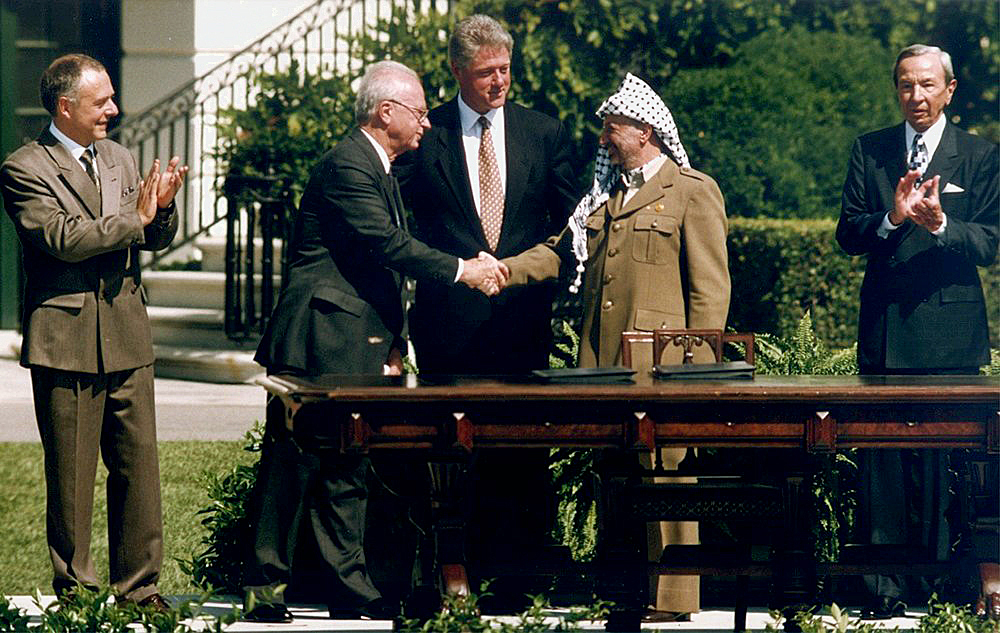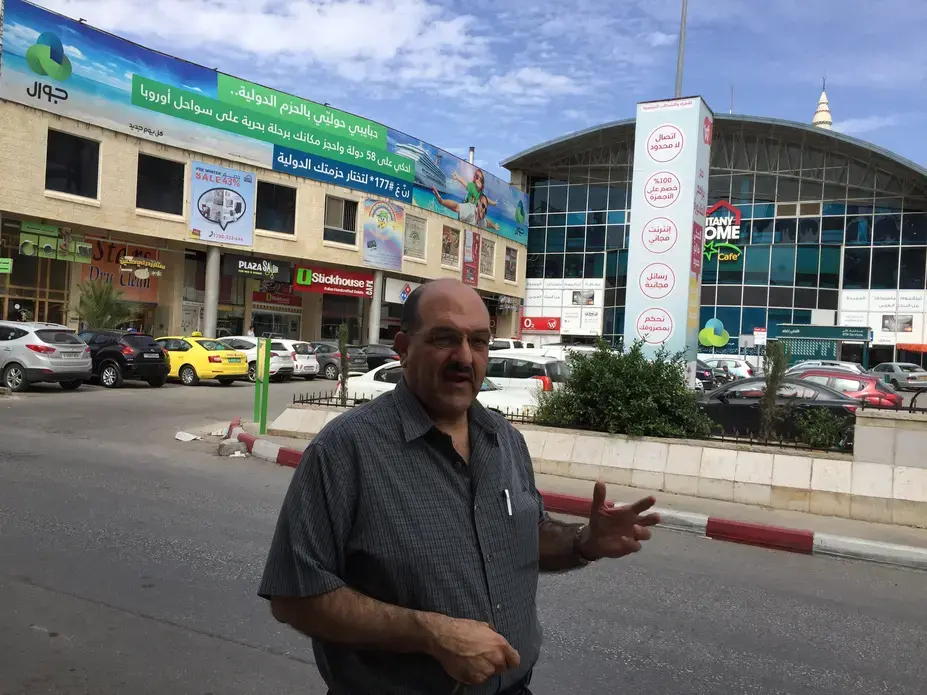AL-BIREH, West Bank — "This is where the clashes are happening," said Sam Bahour today, as he approached the northern entrance to his town of Al-Bireh, next to Palestinian Ramallah on the West Bank. On the hill above the entrance sits Beit El, Israel's administrative and military headquarters for West Bank operations. "That's the CEO of the occupation."
The Handshake and the Fists
Twenty years after an assassination changed the course of Israeli history, emigrants from the Pittsburgh region to the Holy Land live on all sides of the world's most intractable divide.
The Pittsburgh Post-Gazette's Rich Lord and Larry Roberts are in Israel this week, supported by the Pulitzer Center on Crisis Reporting, exploring the lives of ordinary people in this polarized place. Some of the people you'll meet here believe that familiarity can ease the anger between Arabs and Jews. A few who came in peace now cry for justice. Others are standing firm on land where it often rains stones.
On Sunday, we'll look at Israel 20 years after the assassination of Prime Minister Yitzhak Rabin, who famously shook hands with Palestinian Chairman Yasser Arafat at the White House in 1993. Until then, follow Larry and Rich here every day as they bring images and stories from Israel's fault lines.
Mr. Bahour, 51, a Youngstown native, doesn't participate in the stone throwing and tire burning that occur here most nights. "What I do is resisting the occupation," he said. "I do it through economic development. I feel that's more effective than throwing a stone at an armored vehicle. It's not even going to dent it."
He has leveraged his computer technology degree from Youngstown State University, and a family background in the grocery business, to create jobs in Palestinian towns. He helped to found the Palestine Communications Company, created the Bravo supermarket chain and developed the West Bank's first mall. He's proud of the dusty, busy Ramallah area precisely because it overcomes challenges -- but he yearns to see how it would grow without the myriad Israeli encroachments on daily life here.
"We are like a spring that is compressed," he said. "As soon as the boot of occupation is removed, we will prosper."
"The five-star occupation"
Mr. Bahour could have stayed at the Boardman, Ohio, software company that hired him out of college, but instead decided in 1994 to move to the land of his father. Israeli Prime Minister Yitzhak Rabin and Palestinian Chairman Yasser Arafat had famously clasped hands, the Oslo Accords seemed to lay out a path to peace, and there was money to be made. He married a Palestinian and attended Tel Aviv University, studying alongside young Jews.
Ramallah, with hills no less steep than Beechview's and views like Mount Washington's, sits in the middle of the West Bank, which Israel captured from Jordan in 1967. Though many Palestinians consider East Jerusalem their true capital, Ramallah emerged after the Oslo Accords as the administrative center of the Palestinian Authority. As such, it has benefitted more from international investment than have Nablus and Hebron, and Israel treads less heavily, making it, in Mr. Bahour's words, "the five-star occupation."
In 1999, even though hopes for a full agreement between Israeli and Palestinian leadership was fading, he got a job developing The Plaza mini-mall. The eruption of the Second Intifada in 2000, though, led to open warfare. "Literally bombs were being dropped on Ramallah," he said, "while I was trying to put glass windows in the new mall."
He has since opened eight Bravo stores, and has done well enough to send a daughter to the Massachusetts Institute of Technology to study chemical engineering.
Stranger in the bathroom
Even as he tries to do deals to build a children's services center, a solar farm and a store near Birzeit University, Mr. Bahour smarts at the checkpoints he must pass through and the roads he is barred from driving. He resents the permits he must get to travel even to nearby Jerusalem, the ban on Palestinian development in more than half of the West Bank, and especially the Jewish settlements visible from the roof of his house.
"I'm a big guy," he said. "I can probably come into your house and take your bathroom. You may accept that for a day. But after 40 years, you'd get upset.
"Some of them will have to be evacuated."
That's a tall order. Since the settlement movement started with small bands of squatters in the 1970s, few Israeli governments have had the political fortitude to order Jewish soldiers to drag Jewish civilians from the West Bank lands they call Judea and Samaria. Mr. Rabin opposed substantial settlement of the West Bank, but was assassinated by a Jewish extremist 20 years ago.
The current government has occasionally succumbed to American pressure to pause Jewish construction in the West Bank, but at present new housing Jewish housing is going up fast. It becomes harder to conceive of a border that would allow those Jews to keep their homes while giving Palestinians a meaningful state, Mr. Bahour said.
Where are our cards?
If there's no deal soon, Mr. Bahour predicted, "My children's generation will drop statehood and start looking to the Palestinian leadership in the [Israeli] Knesset," where the Joint Arab List holds 13 of 120 legislative seats. The West Bank Palestinians, he predicted, may be inspired by Knesset members like Ayman Udeh and shift toward a civil rights model, peacefully but forcefully demanding to be treated no worse than the Arabs or Jews in Israel.
"We heard you have free healthcare in Israel," he said. "Where do we pick up our cards? That's where it's heading."
All of that won't likely play out before his elder daughter graduates from MIT, or perhaps even before his younger daughter, now in 10th grade, finishes college. What will they do?
"We're in that discussion right now," he said. The West Bank economy may not be able to fully utilize the skills of an MIT-trained chemical engineer, he fretted.
In the meantime, he said, he'll do what he can to lay the groundwork that might allow his daughters to thrive here. "To me, every single job we create in Palestine is an act of resistance to occupation," he said, "because it keeps a Palestinian in Palestine."








